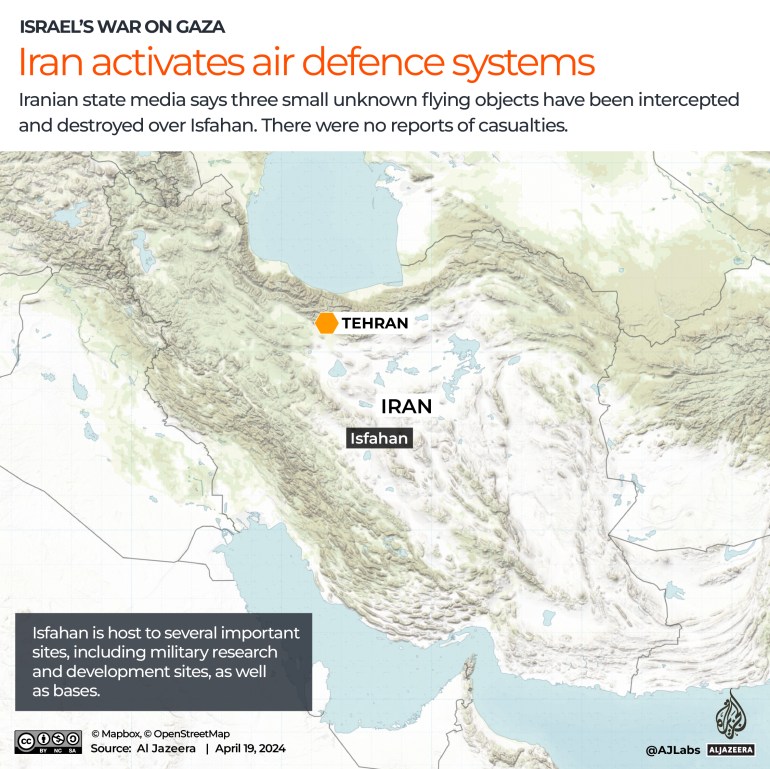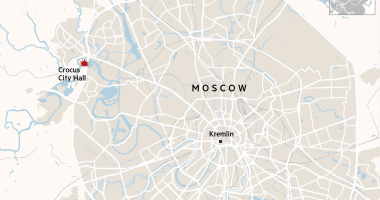EXPLAINER
Iran deployed air defence batteries to intercept and destroy three drones over the city of Isfahan, raising concerns about a potential confrontation with Israel.
Iran’s air defence systems were deployed in multiple parts of the country early Friday morning after reports of explosions near the airport in Isfahan province, amid rapidly escalating tensions with Israel, according to state media.
On Friday, there were also reported explosions in Iraq and Syria.
Here is what we know so far:
What happened and when?
- Iran fired air defence batteries in multiple provinces and shot down three small drones over the central city of Isfahan, according to state media reports. The reports came hours after US media reported that senior US officials said Israeli missiles had hit an Iranian site.
- “We also understand that the air defence systems over the city of Tabriz in the northwestern part of Iran were also activated,” Al Jazeera’s Dorsa Jabbari said, reporting from Tehran.
- Flights were suspended in various regions, including the capital city of Tehran and Isfahan. But about four hours later they were resumed, and there were no reports of casualties.
- “At 4:45 (01:15 GMT), we heard gunshots. There was nothing going on,” a reporter from Iran’s semiofficial Tasnim news agency said. “It was the air defence, these guys that you’re watching, and over there too.”
- Explosions were also reported in Iraq and Syria, with Iranian state media saying that multiple military-related sites in Syria were targeted.
- Syria’s state-run SANA news agency said that at approximately 2:55am (23:25 GMT) on Friday, the “Israeli enemy launched an aggression with missiles”. Israel targeted Syria’s “air defense sites in the southern region. The aggression led to material losses”, SANA reported.
- This escalation comes less than a week after Iran launched more than 300 missiles and drones at Israel in response to a suspected Israeli strike on the Iranian embassy compound in Syria on April 1 that killed seven members of Iran’s Islamic Revolutionary Guards Corps (IRGC). Tensions between Iran and Israel have soared amid Israel’s ongoing war on Gaza.
Where is Isfahan and where did the attacks take place?
- Iran’s Fars News Agency said “three explosions” were heard near Qahjavarestan city in Isfahan province, close to the province’s airport and an army airbase.
- Isfahan, located in the centre of Iran, hosts the country’s uranium conversion facility in the southeastern Zerdenjan area. Additionally, the Natanz uranium enrichment site is also located within the province.
- Isfahan also hosts a significant Iranian airbase that hosts Iran’s ageing fleet of US-made F-14 Tomcats, which were purchased prior to the 1979 Islamic revolution.
- According to a report by The Associated Press news agency, the region of Syria that was targeted is directly west of Isfahan, approximately 1,500km (930 miles) away, and to the east of Israel. In Iraq, the area affected was not immediately clear.

Did Israel attack Iran?
- Iranian media, quoting Iranian officials, suggested that there was no evidence yet of a foreign hand in the attacks. Al Jazeera’s Jabbari said Iranian media was downplaying the incident.
- Instead, some unconfirmed Iranian media reports suggested that the strikes were potentially launched using small quadcopters — essentially unmanned, autonomously operated helicopters.
- Israel has not commented on the attacks yet.
- US broadcasters quoted American officials as saying that Israeli missiles had hit Iran. According to a report by CNN, the US was given advance notification of the strike but “didn’t greenlight” it.
- Hours after the explosion, reports said Isfahan was “calm”. However, according to some analysts, regardless of the extent of the damage, the suspected strike sends a message to Iran about the vulnerability of its security.
- Isfahan “is deep within the country”, which according to Hamidreza Azizi, visiting fellow at the German Institute for International and Security Affairs, could indicate “Israel’s intelligence and operational access, regardless of whether the origin of the attack was internal or external”.
-
In a news conference, Italy’s Foreign Minister Antonio Tajani said the US government told the G7 grouping of nations it was informed at the “very last minute” by Israel about the attack “but there was no sharing of the attack by the US. It was a mere information”.
What is Israel saying?
- Israel has not claimed responsibility for the attack, and the military has not commented either.
- According to a report by The Washington Post, quoting an Israeli official, the strike was intended to signal to Iran that Israel has the ability to reach Iran with its weapons, and it was “carefully calibrated”.
- However, the attack in Iran revealed divisions within Israel.
- Far-right security minister Itamar Ben-Givr suggested, in a social media post, that the suspected Israeli strike on Iran was weak. Ben-Gvir has been calling for a harsh military response after Iran’s retaliatory attack against Israel on April 13.
- Opposition leader Yair Lapid hit back. “Never before a minister has done such a heavy damage to the country’s security, its image, and its international status,” Lapid wrote on X. “In an unforgivable tweet of one word, Ben-Gvir managed to sneer and shame Israel from Tehran to Washington,” he said.
What did Iran say?
- Iranian officials have maintained that shots were fired at some objects and there was no damage caused.
- This attack came a day after the IRGC warned Israel against attacking Iranian nuclear sites.
What is the background?
- Israel and Iran have been longtime rivals in the region. Iran has maintained steady pressure on Israel through its allies, especially Hezbollah in Lebanon.
- Israel’s war on Gaza, which started after the Palestinian group Hamas led an attack in southern Israel on October 7, has intensified the existing tensions.
- Hezbollah and Iranian-backed armed groups in Iraq and Yemen have targeted US military positions in the region, and Iran’s leadership has cautioned that its allies will continue their attacks until Israel’s war on Gaza concludes.
- But fears of a large-scale regional war escalated in early April when Iran accused Israel of bombing its diplomatic mission in Damascus, Syria. Since then the region has been on alert, with intelligence warnings of an imminent Iranian attack. On April 13, Iran fired more than 300 missiles and drones at Israel — the first time ever that it had targeted Israel from Iranian soil.
- Since then, worries have mounted about an Israeli counterresponse. According to Al Jazeera’s Diplomatic Editor James Bays, “it has been dangerous since the Iranian attack on Israel on April 13.”
What’s next?
- On Thursday, Iranian Foreign Minister Hossein Amirabdollahian had warned that Iran would not hesitate to give “a decisive and proper response to [Israel]” in case of an attack.
- However on Friday, when an Iranian commander was asked in the media whether the attack would provoke a response, he said, “You have seen Iran’s response already”, according to Al Jazeera’s Jabbari in Tehran. This, Jabbari reported, could indicate that Friday’s attack might halt — at least for the moment — the “back-and-forth threats and counterthreats that have been made by Iranian officials as well as their Israeli counterparts”.
Read More: World News | Entertainment News | Celeb News
Al Jazeera










